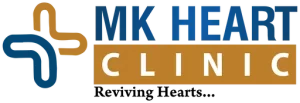The signs of a healthy heart are vital markers of overall health. Your heart works relentlessly to ensure blood circulates throughout your body, delivering oxygen and nutrients while removing waste. But how do you truly know if your heart is healthy? Recognizing these signs is the key to proactive health management.
In this blog, I, Dr. M. Kathiresan, will guide you through the signs of a healthy heart, the symptoms of potential problems, and ways to maintain optimal heart health. By understanding these critical indicators, you can ensure your heart remains in its best condition.
What Are the Signs of a Healthy Heart?

Have you ever wondered, what are the signs of a healthy heart? Your heart doesn’t always make its health obvious, but there are several clear indicators that it’s working well. Here’s what to look for:
- Efficient Resting Heart Rate: A resting heart rate between 60 and 100 beats per minute is an excellent sign. It indicates that your heart is pumping blood efficiently.
- Clear Breathing: If you can breathe deeply and evenly without any shortness of breath, it’s a sign your heart is supplying your lungs and body with adequate oxygen.
- Good Energy Levels: Feeling active and energetic throughout the day means your heart is delivering blood and oxygen effectively.
Understanding what are the signs of a healthy heart empowers you to make informed decisions about your lifestyle and overall health. At the same time, recognizing the Symptoms of Heart Attack is crucial for early intervention and prevention of serious complications.
Heart Attack Treatment
Heart attacks are serious medical emergencies that require immediate attention. Heart attack treatment is essential to minimize damage to the heart muscle and improve chances of survival. A heart attack occurs when blood flow to the heart is blocked, usually by a blood clot, leading to potential damage or even death of heart tissue. In this article, we’ll explore various aspects of heart attacks, including their causes, symptoms, and treatment. You’ll also learn about heart attack first aid treatment, treatment for mild heart attacks, and effective ways to prevent heart attacks
7 Signs of a Healthy Heart
Here are the 7 signs of a healthy heart that everyone should recognize:
- Normal Blood Pressure: A blood pressure reading around 120/80 mmHg shows your heart and arteries are not under stress, ensuring smooth blood flow.
- Good Cholesterol Balance: Healthy cholesterol levels, particularly high HDL (good cholesterol), prevent plaque buildup in arteries and reduce heart disease risk.
- No Swelling or Fluid Retention: Swelling in the legs or ankles can indicate poor circulation, so its absence suggests your heart is working well.
- Fast Recovery After Exercise: If your heart rate returns to normal quickly after physical exertion, it’s a clear sign of a healthy heart.
- Healthy Skin Tone: Proper circulation gives your skin a natural, healthy glow.
- Clear Mental Focus: A sharp mind is often linked to good blood flow, another positive indicator of heart health.
- Stable Weight: Maintaining a healthy weight without unexpected fluctuations can reflect a well-functioning cardiovascular system.
Recognizing these 7 signs of a healthy heart is crucial for staying proactive about your heart’s condition.

Common Signs Associated with a Healthy Heart
Recognizing the signs of a healthy heart can give you peace of mind and motivate you to continue practicing good habits. Here are some indicators that your heart is in top shape:
Physical Signs
- Good Energy Levels: You can perform daily activities without feeling constantly fatigued.
- Normal Blood Pressure: Consistently between 90/60 mmHg and 120/80 mmHg.
- Stable Heart Rate: A resting heart rate between 60 and 100 beats per minute.
- Healthy Breathing: No shortness of breath during mild to moderate activities.
- Recovery After Exercise: Heart rate returns to normal quickly after physical exertion.
If you’re experiencing these signs of a healthy heart, you’re on the right track! However, even with positive signs, experts at the top heart-checking clinic and the best heart specialist in Chennai recommend not skipping routine evaluations.
What Does Your Heart Do to Keep You Healthy?
Your heart is a tireless organ, working every moment to keep you alive. It pumps approximately 2,000 gallons of blood daily to deliver oxygen and nutrients to every cell while removing carbon dioxide and other waste. By supporting brain function, immune response, and energy levels, the heart ensures the body functions seamlessly.
Monitoring what are the signs of a healthy heart allows you to appreciate how much your heart does for you.
What Are the Signs Your Heart May Not Be Healthy?
Recognizing the 7 signs your heart is not well can help you take timely action and prevent complications. These warning signs include:
- Chest Pain or Tightness: Discomfort in the chest can indicate reduced oxygen supply to the heart, a potential sign of coronary artery disease.
- Shortness of Breath: Feeling out of breath without exertion suggests your heart may be struggling to pump blood effectively.
- Heart Palpitations: A racing or irregular heartbeat can indicate arrhythmia or other heart conditions.
- Fatigue: Constant tiredness might mean your heart isn’t efficiently supplying your body with oxygen and nutrients.
- Swelling in the Feet or Legs: Fluid retention in your lower limbs is often an early sign of heart failure.
- Dizziness or Lightheadedness: Poor circulation due to heart issues can lead to a lack of oxygen in the brain, causing dizziness.
- Sudden Weight Gain: Rapid, unexplained weight gain could be linked to fluid retention caused by heart failure.
If you notice any of these 7 signs your heart is not well, consult a healthcare provider immediately.
Are Warning Signs Different for Women and Men?
Yes, heart symptoms can differ significantly between men and women. While men often experience classic symptoms like chest pain, women are more likely to report:
- Nausea, dizziness, or indigestion.
- Pain in the back, neck, or jaw.
- Anxiety and extreme fatigue.
Understanding these gender-specific differences ensures that both men and women can identify potential heart problems early.
Prevention and Maintaining a Healthy Heart
Prevention is always better than cure. Here are some actionable tips to maintain the signs of a healthy heart:
- Adopt a Balanced Diet: Prioritize fruits, vegetables, whole grains, and lean proteins.
- Exercise Regularly: Engage in at least 30 minutes of moderate activity, like walking or cycling, most days.
- Quit Smoking: Smoking damages arteries and increases the risk of heart disease.
- Monitor Blood Pressure and Cholesterol: Regular check-ups help detect abnormalities early.
- Manage Stress: Incorporate mindfulness, yoga, or relaxation techniques into your daily routine.
By following these steps, you can consistently maintain what are the signs of a healthy heart and enjoy long-term wellness.
Emotional and Lifestyle Signs
- Good Sleep Quality: No interruptions from breathing issues like sleep apnea.
- No Swelling: Legs, feet, and abdomen are free from unexplained swelling.
- Positive Mood: A healthy heart supports better mental health and reduced anxiety.
Consulting with the best cardiologist in Chennai can confirm these observations, helping you ensure that these signs of a healthy heart truly reflect internal cardiovascular strength.
Don’t Skip Regular Screenings
Even when you notice the signs of a healthy heart, regular health checks are essential. Heart disease can sometimes develop silently, without obvious symptoms.
Why Regular Checkups Matter
- Detect Early Risks: Blood pressure, cholesterol, and sugar levels need regular monitoring.
- Update Your Fitness Plan: Adapt your exercise and diet based on your heart’s condition.
- Get Professional Advice: The best cardiologist in Chennai or best heart specialist in Chennai can recommend preventive measures tailored to you.
- Peace of Mind: Knowing that a professional at a top heart checking clinic has assessed your heart provides great relief.
Skipping screenings could mean missing early warning signs that even the healthiest people sometimes face. Making regular appointments shows that you’re serious about sustaining the signs of a healthy heart long-term.
Heart Attack Recovery
Preventing a Heart Attack
Preventing a heart attack is one of the most critical steps you can take for your health. As Dr. M. Kathiresan, a leading cardiologist, often says, “Your heart is your life’s engine, and it deserves the best care possible.” Many people wonder if heart disease can truly be prevented, reversed, or cured. The good news is that many of the factors contributing to heart attacks can be controlled with a little effort and knowledge. In this blog, we will explore practical steps for preventing a heart attack, and I’ll guide you through understanding risk factors, lifestyle tips, and how to take charge of your heart health.
How to Control Heart Attack
Heart attacks can strike unexpectedly, and knowing how to control heart attack is crucial for saving lives. Dr. Kathiresan, a renowned cardiologist, stresses the importance of early recognition of heart attack symptoms and acting quickly to mitigate damage. With prompt medical intervention, many heart attacks can be controlled, and the risks of severe complications can be reduced. This blog post will guide you through how to stop a heart attack at home, prevent it before it happens, and manage risk factors to maintain heart health.
Heart Attack Recovery
Heart attack recovery is a journey that combines medical care, lifestyle adjustments, and emotional resilience. Recovery often feels daunting, but with the right support, you can regain your health and confidence. Experts like Dr. Kathiresan are instrumental in guiding patients through this process, ensuring that they heal and thrive. This comprehensive guide explores all aspects of recovery, including diet, exercise, and emotional well-being, offering practical tips to help you on your path to wellness.
Conclusion
The signs of a healthy heart are your body’s way of telling you that everything is working as it should. From a steady heart rate to clear mental focus, these indicators are essential for your overall well-being. If you ever notice symptoms like fatigue, chest pain, or swelling, don’t hesitate to seek medical help.As a specialist in cardiology, I, Dr. M. Kathiresan, emphasize the importance of proactive heart care.

